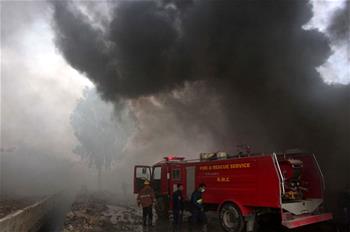BEIJING, Feb. 7 (Xinhua) -- The central authorities Tuesday issued guidelines on an ecological "red line" that will declare certain regions under mandatory and rigorous protection.
The document was jointly issued by the General Office of the Communist Party of China (CPC) Central Committee and the General Office of the State Council.
By the end of 2020, according to the document, China should have clearly defined the "red line."
Given that China's ecological environment remains fragile and the environmental safety situation is pretty grim, the ecological "red line" serves as both a "bottom line" and a "lifeline" in safeguarding national ecological safety, according to the document.
The "red line" strategy will cover regions with important ecological functions, including water and soil conservation, biodiversity maintenance as well as windbreak and sand-fixation, along with ecologically fragile regions which are prone to soil erosion, desertification and salinization.
The guidelines asked Beijing, Tianjin and Hebei, as well as regions along the Yangtze River Economic Belt to draw up a "red line" for ecological protection by the end of 2017, while other areas should come up with a "red line" before the end of 2018.
By the end of 2020, the demarcation of the border and calibration of the regions should be completed and an ecological protection "red line" system will be basically established.
By 2030, the layout of the ecological protection "red line" will be further optimized, effectively implemented, the ecological function of the regions promoted, and national ecological safety guaranteed, according to the document.
The move aims to ensure protected regions will not be ecologically degraded, and their acreage will not be decreased.
"China started to explore the theory and methods of the 'red line' in 2012 and made a series of pilots programs," said Lu Jun, deputy head of the Chinese Academy for Environmental Planning.
China's environmental protection still lags behind its economic status, and decades of breakneck growth have left the country saddled with problems such as smog and contaminated waterways and soil.
In one of its latest attempts to fight pollution, China appointed "river chiefs" nationwide in December.
China detained 720 people for environment-related crimes in 2016, according to the national environment work conference in January.
Through public tip-offs and random checks, inspectors looked into 33,000 cases and imposed fines totalling 440 million yuan (about 63.6 million U.S. dollars) after central government inspections in several provinces and municipalities, including Beijing and Shanghai.
Last year, a total of 4.05 million high-emission vehicles were taken off the country's roads.
Partly due to such efforts, Chinese cities reported less PM2.5 pollution in 2016, with the average density of PM2.5 in 338 cities falling by 6 percent. Meanwhile, days with good air quality rose 2.1 percent from a year ago.
Related:
Xi calls for building of socialist ecological civilization
BEIJING, Dec. 2 (Xinhua) -- President Xi Jinping has called for more to be done to deepen reforms and establish a framework of institutions to promote ecological civilization in China.
The goal of achieving an ecological civilization is a key part of China's overall development strategy and governments at all levels should remember that clear waters and green mountains are invaluable assets, said Xi, according to a statement released Friday by the central authorities. Full Story











